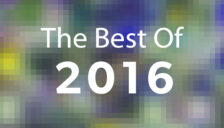2016 was…a year. What else is there too say? There’s nothing profound about how tough it was for a lot of people. While there are logical reasons for the number of celebrities and beloved musical personalities we lost, there are also plenty of personal reasons for why, at times, it really sucked. I lost both a family member and friend this year. But to solely call it a bad year wouldn’t exactly be fair to the people who also made it a special year for me. I got engaged this year. I went on tour, twice, and put out my first album. So while 2016 closed a lot of doors that left me feeling upset and anxious, it ultimately opened more with endless potential for myself and the people I hope will be a part of my life for years to come. And luckily, I didn’t go through anything alone. My Top Albums and Songs of 2016 reflect the artists that I spent time with during both my lowest and highest points over the past 12 months.
The Fidget Cube: A Vinyl Desk Toy
The Fidget Cube that started on Kickstarter is now up for order on their website.
An unusually addicting, high-quality desk toy designed to help you focus. Fidget at work, in class, and at home in style. Fidget Cube has six sides. Each side features something to fidget with: Click. Glide. Flip. Breathe. Roll. Spin.
This is devilishly clever.
OmniFocus Adds Global Search
OmniGroup have released OmniFocus 2.8 for Mac:
Happy New Year! After a quiet couple of weeks, we are back in the office today and releasing OmniFocus 2.8 for Mac, which includes one of our most requested features: Global Search.
Great new addition to the most important app I use.
Portland Gear
My girlfriend picked me up one of these shirts from “Portland Gear” for Christmas. I’m digging the little P logo. Really comfortable shirt.
HandBreak Leaves Beta After 13 Years
HandBreak, one of the best video transcoders out there, has finally left beta and hit version 1.0 … after 13 years.
After more than 13 years of development, the HandBrake Team is delighted to present HandBrake 1.0.0. Thank you to all of our many contributors over the years for making HandBrake what it is today.
A Computer for Everything: One Year of iPad Pro
Federico Viticci, over at MacStories, has a killer article about using the iPad Pro for a year and how it’s become his favorite computer of all time:
Much of the iPad’s strength lies in iOS and its app ecosystem. If Apple were to stop making iPads, I’d still prefer to work on a device that runs iOS rather than macOS. iOS is where app innovation happens on a regular basis with developers one-upping each other in terms of what software can achieve; I also prefer the structure and interactions of iOS itself. The iPad Pro is the purest representation of iOS: it’s a computer that can transform into anything you need it to be.
And:
There’s an important difference between the old iOS automation kin and the modern wonders of Workflow. Four years ago, URL schemes were the only way to turn an iPad into a passable work device for advanced tasks. Automation was an escape hatch from Apple’s limitations and the immaturity of iOS. Today, iOS is a stronger, more capable platform that, for many, is superior to macOS. There’s still work to be done, but, for the most part, iOS automation today is an optional enhancement – a way to speed up tasks and make them more accessible. In four years, and largely because of iOS 8 and iOS 9, iOS automation has evolved from a workaround into a creative optimization.
The entire thing is full of great insights and it got me playing around with some new automation techniques on iOS. I realized I haven’t been using Workflow and Launch Center Pro to their full capacity.
Nerdy T-Shirts
I’m kinda loving these super cool looking (and nerdy) t-shirts. I just may have to pick up the retro looking Star Wars one.
The DraftTable for the iPad Pro
I don’t have an iPad Pro but the DraftTable from ElevationLab looks quite clever. If I ever upgrade to an iPad with Apple Pencil support I’d probably think about one of these.
P.S.: Their Elevation Dock, my favorite iPhone dock, is currently also on sale.
The Constitution Lets the Electoral College Choose the Winner. They Should Choose Clinton.
Lawrence Lessig, writing at The Washington Post:
The framers believed, as Alexander Hamilton put it, that “the sense of the people should operate in the choice of the [president].” But no nation had ever tried that idea before. So the framers created a safety valve on the people’s choice. Like a judge reviewing a jury verdict, where the people voted, the electoral college was intended to confirm — or not — the people’s choice. Electors were to apply, in Hamilton’s words, “a judicious combination of all the reasons and inducements which were proper to govern their choice” — and then decide. The Constitution says nothing about “winner take all.” It says nothing to suggest that electors’ freedom should be constrained in any way. Instead, their wisdom — about whether to overrule “the people” or not — was to be free of political control yet guided by democratic values. They were to be citizens exercising judgment, not cogs turning a wheel.
I agree, but the odds of this happening are infinitesimally small.
Fighting Authoritarianism: 20 Lessons
Reproduced on Kottke:
Americans are no wiser than the Europeans who saw democracy yield to fascism, Nazism, or communism. Our one advantage is that we might learn from their experience. Now is a good time to do so. Here are twenty lessons from the twentieth century, adapted to the circumstances of today.
1) Do not obey in advance. Much of the power of authoritarianism is freely given. In times like these, individuals think ahead about what a more repressive government will want, and then start to do it without being asked. You’ve already done this, haven’t you? Stop. Anticipatory obedience teaches authorities what is possible and accelerates unfreedom.
2) Defend an institution. Follow the courts or the media, or a court or a newspaper. Do not speak of “our institutions” unless you are making them yours by acting on their behalf. Institutions don’t protect themselves. They go down like dominoes unless each is defended from the beginning.
3) Recall professional ethics. When the leaders of state set a negative example, professional commitments to just practice become much more important. It is hard to break a rule-of-law state without lawyers, and it is hard to have show trials without judges.
Read the whole thing.
For Helping Immigrants, Chobani’s Founder Draws Threats
By many measures, Chobani embodies the classic American immigrant success story.
Its founder, Hamdi Ulukaya, is a Turkish immigrant of Kurdish descent. He bought a defunct yogurt factory in upstate New York, added a facility in Twin Falls, Idaho, and now employs about 2,000 people making Greek yogurt.
But in this contentious election season, the extreme right has a problem with Chobani: In its view, too many of those employees are refugees.
As Mr. Ulukaya has stepped up his advocacy — employing more than 300 refugees in his factories, starting a foundation to help migrants, and traveling to the Greek island of Lesbos to witness the crisis firsthand — he and his company have been targeted with racist attacks on social media and conspiratorial articles on websites including Breitbart News.
Facebook Needs to Get Their Shit Together
The most obvious way in which Facebook enabled a Trump victory has been its inability (or refusal) to address the problem of hoax or fake news. Fake news is not a problem unique to Facebook, but Facebook’s enormous audience, and the mechanisms of distribution on which the site relies — i.e., the emotionally charged activity of sharing, and the show-me-more-like-this feedback loop of the news feed algorithm — makes it the only site to support a genuinely lucrative market in which shady publishers arbitrage traffic by enticing people off of Facebook and onto ad-festooned websites, using stories that are alternately made up, incorrect, exaggerated beyond all relationship to truth, or all three. (To really hammer home the cyberdystopia aspect of this: A significant number of the sites are run by Macedonian teenagers looking to make some scratch.)
An American Tragedy
David Remnick, at The New Yorker:
The election of Donald Trump to the Presidency is nothing less than a tragedy for the American republic, a tragedy for the Constitution, and a triumph for the forces, at home and abroad, of nativism, authoritarianism, misogyny, and racism. Trump’s shocking victory, his ascension to the Presidency, is a sickening event in the history of the United States and liberal democracy. On January 20, 2017, we will bid farewell to the first African-American President—a man of integrity, dignity, and generous spirit—and witness the inauguration of a con who did little to spurn endorsement by forces of xenophobia and white supremacy. It is impossible to react to this moment with anything less than revulsion and profound anxiety.
Yes, American Democracy Could Break Down
There are three interlocking reasons why our confidence in the system is naïve. For one, we’re in genuinely uncharted territory with Trump: we’ve simply never seen a candidate with this much disregard for typical Constitutional values get this close to the White House. There’s no precedent for what might happen if he got there. For another, if you look at how our system of checks and balances is really built, it has relatively few resources to stop an authoritarian president from violating the Constitution and getting away with it. And the third reason may be the most unsettling of all: In a democracy, the final brake on the tyrannical exercise of power is public opinion. And polls suggest the American public has never been as skeptical of democracy or as open to authoritarian alternatives like military rule as it is right now. If a President Trump really blew down the walls of our system, a worryingly wide swath of the public would likely stand behind him.
The Internet Is Still Actually Controlled by 14 People Who Hold 7 Secret Keys
It sounds like something out of a Dan Brown book, but it isn’t: The whole internet is protected by seven highly protected keys in the hands of 14 people.
And in a few days, they will hold a historic ritual known as the Root Signing Ceremony.
On Friday morning, the world got a good reminder about the importance of the organization these people belong to.












